Edward Ruadh Butler's Blog
June 27, 2019
Video: Enniscorthy Castle and the Wexford Literary Festival
I'll be speaking at the Wexford Literary Festival at Enniscorthy Castle on Saturday, July 6th. It's a free event (and you can check out all the details HERE) where I'll be chatting about all things Normans, Vikings, 12th century and writing historical fiction - if I do anything, it's talking, so be aware that there is little chance I'll keep to those subjects! There are so many fantastic events over the weekend, it really would be a shame to miss out!Ahead of my chat I thought I'd do a video talking about the location in which my talk will take place - the 13th century 'Norman' Enniscorthy Castle.If you've never been to Enniscorthy, you are really missing out. There is just so much history to keep any visitor interested (click HERE to find out more) and that's not taking in the wider County Wexford region (click HERE to find out more).
There are so many fantastic events over the weekend, it really would be a shame to miss out!Ahead of my chat I thought I'd do a video talking about the location in which my talk will take place - the 13th century 'Norman' Enniscorthy Castle.If you've never been to Enniscorthy, you are really missing out. There is just so much history to keep any visitor interested (click HERE to find out more) and that's not taking in the wider County Wexford region (click HERE to find out more).
 There are so many fantastic events over the weekend, it really would be a shame to miss out!Ahead of my chat I thought I'd do a video talking about the location in which my talk will take place - the 13th century 'Norman' Enniscorthy Castle.If you've never been to Enniscorthy, you are really missing out. There is just so much history to keep any visitor interested (click HERE to find out more) and that's not taking in the wider County Wexford region (click HERE to find out more).
There are so many fantastic events over the weekend, it really would be a shame to miss out!Ahead of my chat I thought I'd do a video talking about the location in which my talk will take place - the 13th century 'Norman' Enniscorthy Castle.If you've never been to Enniscorthy, you are really missing out. There is just so much history to keep any visitor interested (click HERE to find out more) and that's not taking in the wider County Wexford region (click HERE to find out more).
Published on June 27, 2019 02:03
May 10, 2019
Video: Bannow Bay and the 850th anniversary of the Norman arrival in Ireland
There aren't many historical sites in Ireland with the importance that Bannow Island has. In itself the island (which is no longer an island!) is rather dull and even those who make it important probably only spent a week camping on its shores. Yet it was from this place that the Norman invasion of Ireland began.Being down in County Wexford on the weekend of the 850th anniversary of those events was not happenstance, but I took the opportunity to make a short video on the shores of Bannow Bay:
Published on May 10, 2019 07:50
Inspirational Quotes IX: Niamh Boyce
In the 17th century, Sir John Davies, the Attorney General for King James I stated, “There is no nation of people under the sunne that doth love equal and indifferent justice better than the Irish; or will rest better satisfied with the execution thereof although it be against themselves, so that they may have the protection and benefit of the law when upon just cause they do desire it.”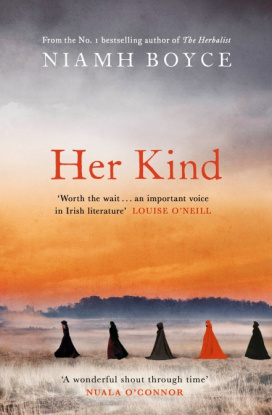 A remnant of the ancient Brehon Laws, his meaning was that nowhere else held the law so high and with such great dignity as did the people of Ireland.When a great injustice occurs, it stays in the public mind for a very long time.In her new novel, Her Kind, Athy writer, Niamh Boyce, attempts to rebalance a wrong that occurred 700 years ago, to give a side of the story for two women who were robbed of their voice, their rights and more by those more powerful than they.Awarded Hennessy XO New Irish Writer of The Year for her poetry, Niamh’s debut novel The Herbalist, was critically acclaimed, won Debut of the Year at the Irish Book Awards and was nominated for an IMPAC Award. Inside the Wolf, her poetry collection was released in 2018. Her work has been broadcast, adapted for stage and anthologised, most recently in ‘The Long Gaze Back,’ ‘The Hennessy Anthology’ and ‘Hallelujah for 50 Foot Women.’With all those plaudits to her name and a new novel, Her Kind (Penguin Random House), inspired by the infamous 14th century Kilkenny witchcraft trial of Alice Kytler (and a shortlisting for the EU Prize for Literature to boot!), out just last month, it seemed time to put my literature-inspired interview - using quotes lifted from the world’s most inspirational books – to Niamh.“We were the people who were not in the papers. We lived in the blank white spaces at the edges of print. It gave us more freedom. We lived in the gaps between the stories”This relates to the why, the why of my novels to date, The Herbalist and Her Kind are linked by the fact that they delve into unrecorded history and voices. Her Kind explored the events around a witchcraft trial – a landmark case in the European history of witchcraft trials.The case had been recounted in Bishop Ledrede’s narrative - The Sorcery Trial of Alice Kytler. In his account he has the starring role as inquisitor fighting a sect of sorceresses. Dame Alice Kytler, her maid Petronelle and the others accused are just pestiferous, a vile nest of vipers – and guilty of course.
A remnant of the ancient Brehon Laws, his meaning was that nowhere else held the law so high and with such great dignity as did the people of Ireland.When a great injustice occurs, it stays in the public mind for a very long time.In her new novel, Her Kind, Athy writer, Niamh Boyce, attempts to rebalance a wrong that occurred 700 years ago, to give a side of the story for two women who were robbed of their voice, their rights and more by those more powerful than they.Awarded Hennessy XO New Irish Writer of The Year for her poetry, Niamh’s debut novel The Herbalist, was critically acclaimed, won Debut of the Year at the Irish Book Awards and was nominated for an IMPAC Award. Inside the Wolf, her poetry collection was released in 2018. Her work has been broadcast, adapted for stage and anthologised, most recently in ‘The Long Gaze Back,’ ‘The Hennessy Anthology’ and ‘Hallelujah for 50 Foot Women.’With all those plaudits to her name and a new novel, Her Kind (Penguin Random House), inspired by the infamous 14th century Kilkenny witchcraft trial of Alice Kytler (and a shortlisting for the EU Prize for Literature to boot!), out just last month, it seemed time to put my literature-inspired interview - using quotes lifted from the world’s most inspirational books – to Niamh.“We were the people who were not in the papers. We lived in the blank white spaces at the edges of print. It gave us more freedom. We lived in the gaps between the stories”This relates to the why, the why of my novels to date, The Herbalist and Her Kind are linked by the fact that they delve into unrecorded history and voices. Her Kind explored the events around a witchcraft trial – a landmark case in the European history of witchcraft trials.The case had been recounted in Bishop Ledrede’s narrative - The Sorcery Trial of Alice Kytler. In his account he has the starring role as inquisitor fighting a sect of sorceresses. Dame Alice Kytler, her maid Petronelle and the others accused are just pestiferous, a vile nest of vipers – and guilty of course.  He had accused the wealthy merchant of making deals with demons, sexual intercourse with a particular demon, Robin Son of Art, of using magic and sorcery and generally usurping the authority of the church, aka his authority. This account is often quoted in relation to the case, so my writing the story from the point of view of the accused, was a way of answering back, of exploring what might have been, what was in the gaps.“Every moment happens twice: inside and outside, and they are two different histories”I’m interested in this - in the fact that there are any amounts of versions of the same story, the same event, a multiplicity of view-points and therefore of truths. Whoever gets to tell the story gets to name, to set their stall out – what would Robinson Crusoe have been called if Man Friday got to name him instead of the other way round? There is no such thing as subjectivity, only versions, everything is told slant, even in law and history – which is mostly told by those who win, those who thrive, and survived – those in power.There is a long history in Ireland of stories being buried, supressed, not just stories – but bodies, heartbreakingly so, in the case of Tuam for example. So, though I often find myself writing history, I enter from it from the here and now – and in that way most historical work is contemporary. There are many histories still to be told, and we can only do it from where we are now, and who we are, and need to acknowledge that.“No need to hurry. No need to sparkle. No need to be anybody but oneself”Good advice from Virginia, from the oft quoted essay, especially in relation to a women needing a room of ones own. As writers go, I don’t particularly feel any kinship to Virginia herself, ( I doubt she would have let me in the house) but this particular quote feels relevant – its seems pressure on artists to sparkle, to be successful isn’t a new thing. I feel, it’s really important as a writer to stay grounded, to not chase ideas, and hooks, or novelty, but to write into the deep darkness and follow their heart.
He had accused the wealthy merchant of making deals with demons, sexual intercourse with a particular demon, Robin Son of Art, of using magic and sorcery and generally usurping the authority of the church, aka his authority. This account is often quoted in relation to the case, so my writing the story from the point of view of the accused, was a way of answering back, of exploring what might have been, what was in the gaps.“Every moment happens twice: inside and outside, and they are two different histories”I’m interested in this - in the fact that there are any amounts of versions of the same story, the same event, a multiplicity of view-points and therefore of truths. Whoever gets to tell the story gets to name, to set their stall out – what would Robinson Crusoe have been called if Man Friday got to name him instead of the other way round? There is no such thing as subjectivity, only versions, everything is told slant, even in law and history – which is mostly told by those who win, those who thrive, and survived – those in power.There is a long history in Ireland of stories being buried, supressed, not just stories – but bodies, heartbreakingly so, in the case of Tuam for example. So, though I often find myself writing history, I enter from it from the here and now – and in that way most historical work is contemporary. There are many histories still to be told, and we can only do it from where we are now, and who we are, and need to acknowledge that.“No need to hurry. No need to sparkle. No need to be anybody but oneself”Good advice from Virginia, from the oft quoted essay, especially in relation to a women needing a room of ones own. As writers go, I don’t particularly feel any kinship to Virginia herself, ( I doubt she would have let me in the house) but this particular quote feels relevant – its seems pressure on artists to sparkle, to be successful isn’t a new thing. I feel, it’s really important as a writer to stay grounded, to not chase ideas, and hooks, or novelty, but to write into the deep darkness and follow their heart.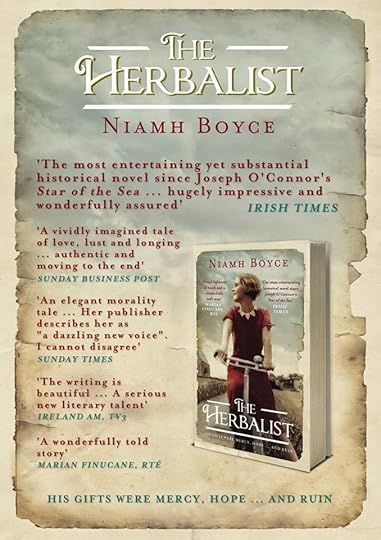 Ruadh: Thanks so much for taking time out to do this 'interview' and the very best of luck to you and Her Kind!PURCHASEHer Kind has been shortlisted for the EU Prize for Literature. It is available from Amazon, and Book Depository for those in the US.There are signed copies in the following bookshops in Ireland: Dubray Books in Kilkenny and Grafton Street; The Book Centres in Kilkenny and Wexford; Woodbine Books, Kilcullen; Easons, Newbridge; The Gutter Bookshop in Temple Bar; and in all Easons in Dublin city centre and environs.
Ruadh: Thanks so much for taking time out to do this 'interview' and the very best of luck to you and Her Kind!PURCHASEHer Kind has been shortlisted for the EU Prize for Literature. It is available from Amazon, and Book Depository for those in the US.There are signed copies in the following bookshops in Ireland: Dubray Books in Kilkenny and Grafton Street; The Book Centres in Kilkenny and Wexford; Woodbine Books, Kilcullen; Easons, Newbridge; The Gutter Bookshop in Temple Bar; and in all Easons in Dublin city centre and environs.
 A remnant of the ancient Brehon Laws, his meaning was that nowhere else held the law so high and with such great dignity as did the people of Ireland.When a great injustice occurs, it stays in the public mind for a very long time.In her new novel, Her Kind, Athy writer, Niamh Boyce, attempts to rebalance a wrong that occurred 700 years ago, to give a side of the story for two women who were robbed of their voice, their rights and more by those more powerful than they.Awarded Hennessy XO New Irish Writer of The Year for her poetry, Niamh’s debut novel The Herbalist, was critically acclaimed, won Debut of the Year at the Irish Book Awards and was nominated for an IMPAC Award. Inside the Wolf, her poetry collection was released in 2018. Her work has been broadcast, adapted for stage and anthologised, most recently in ‘The Long Gaze Back,’ ‘The Hennessy Anthology’ and ‘Hallelujah for 50 Foot Women.’With all those plaudits to her name and a new novel, Her Kind (Penguin Random House), inspired by the infamous 14th century Kilkenny witchcraft trial of Alice Kytler (and a shortlisting for the EU Prize for Literature to boot!), out just last month, it seemed time to put my literature-inspired interview - using quotes lifted from the world’s most inspirational books – to Niamh.“We were the people who were not in the papers. We lived in the blank white spaces at the edges of print. It gave us more freedom. We lived in the gaps between the stories”This relates to the why, the why of my novels to date, The Herbalist and Her Kind are linked by the fact that they delve into unrecorded history and voices. Her Kind explored the events around a witchcraft trial – a landmark case in the European history of witchcraft trials.The case had been recounted in Bishop Ledrede’s narrative - The Sorcery Trial of Alice Kytler. In his account he has the starring role as inquisitor fighting a sect of sorceresses. Dame Alice Kytler, her maid Petronelle and the others accused are just pestiferous, a vile nest of vipers – and guilty of course.
A remnant of the ancient Brehon Laws, his meaning was that nowhere else held the law so high and with such great dignity as did the people of Ireland.When a great injustice occurs, it stays in the public mind for a very long time.In her new novel, Her Kind, Athy writer, Niamh Boyce, attempts to rebalance a wrong that occurred 700 years ago, to give a side of the story for two women who were robbed of their voice, their rights and more by those more powerful than they.Awarded Hennessy XO New Irish Writer of The Year for her poetry, Niamh’s debut novel The Herbalist, was critically acclaimed, won Debut of the Year at the Irish Book Awards and was nominated for an IMPAC Award. Inside the Wolf, her poetry collection was released in 2018. Her work has been broadcast, adapted for stage and anthologised, most recently in ‘The Long Gaze Back,’ ‘The Hennessy Anthology’ and ‘Hallelujah for 50 Foot Women.’With all those plaudits to her name and a new novel, Her Kind (Penguin Random House), inspired by the infamous 14th century Kilkenny witchcraft trial of Alice Kytler (and a shortlisting for the EU Prize for Literature to boot!), out just last month, it seemed time to put my literature-inspired interview - using quotes lifted from the world’s most inspirational books – to Niamh.“We were the people who were not in the papers. We lived in the blank white spaces at the edges of print. It gave us more freedom. We lived in the gaps between the stories”This relates to the why, the why of my novels to date, The Herbalist and Her Kind are linked by the fact that they delve into unrecorded history and voices. Her Kind explored the events around a witchcraft trial – a landmark case in the European history of witchcraft trials.The case had been recounted in Bishop Ledrede’s narrative - The Sorcery Trial of Alice Kytler. In his account he has the starring role as inquisitor fighting a sect of sorceresses. Dame Alice Kytler, her maid Petronelle and the others accused are just pestiferous, a vile nest of vipers – and guilty of course.  He had accused the wealthy merchant of making deals with demons, sexual intercourse with a particular demon, Robin Son of Art, of using magic and sorcery and generally usurping the authority of the church, aka his authority. This account is often quoted in relation to the case, so my writing the story from the point of view of the accused, was a way of answering back, of exploring what might have been, what was in the gaps.“Every moment happens twice: inside and outside, and they are two different histories”I’m interested in this - in the fact that there are any amounts of versions of the same story, the same event, a multiplicity of view-points and therefore of truths. Whoever gets to tell the story gets to name, to set their stall out – what would Robinson Crusoe have been called if Man Friday got to name him instead of the other way round? There is no such thing as subjectivity, only versions, everything is told slant, even in law and history – which is mostly told by those who win, those who thrive, and survived – those in power.There is a long history in Ireland of stories being buried, supressed, not just stories – but bodies, heartbreakingly so, in the case of Tuam for example. So, though I often find myself writing history, I enter from it from the here and now – and in that way most historical work is contemporary. There are many histories still to be told, and we can only do it from where we are now, and who we are, and need to acknowledge that.“No need to hurry. No need to sparkle. No need to be anybody but oneself”Good advice from Virginia, from the oft quoted essay, especially in relation to a women needing a room of ones own. As writers go, I don’t particularly feel any kinship to Virginia herself, ( I doubt she would have let me in the house) but this particular quote feels relevant – its seems pressure on artists to sparkle, to be successful isn’t a new thing. I feel, it’s really important as a writer to stay grounded, to not chase ideas, and hooks, or novelty, but to write into the deep darkness and follow their heart.
He had accused the wealthy merchant of making deals with demons, sexual intercourse with a particular demon, Robin Son of Art, of using magic and sorcery and generally usurping the authority of the church, aka his authority. This account is often quoted in relation to the case, so my writing the story from the point of view of the accused, was a way of answering back, of exploring what might have been, what was in the gaps.“Every moment happens twice: inside and outside, and they are two different histories”I’m interested in this - in the fact that there are any amounts of versions of the same story, the same event, a multiplicity of view-points and therefore of truths. Whoever gets to tell the story gets to name, to set their stall out – what would Robinson Crusoe have been called if Man Friday got to name him instead of the other way round? There is no such thing as subjectivity, only versions, everything is told slant, even in law and history – which is mostly told by those who win, those who thrive, and survived – those in power.There is a long history in Ireland of stories being buried, supressed, not just stories – but bodies, heartbreakingly so, in the case of Tuam for example. So, though I often find myself writing history, I enter from it from the here and now – and in that way most historical work is contemporary. There are many histories still to be told, and we can only do it from where we are now, and who we are, and need to acknowledge that.“No need to hurry. No need to sparkle. No need to be anybody but oneself”Good advice from Virginia, from the oft quoted essay, especially in relation to a women needing a room of ones own. As writers go, I don’t particularly feel any kinship to Virginia herself, ( I doubt she would have let me in the house) but this particular quote feels relevant – its seems pressure on artists to sparkle, to be successful isn’t a new thing. I feel, it’s really important as a writer to stay grounded, to not chase ideas, and hooks, or novelty, but to write into the deep darkness and follow their heart. Ruadh: Thanks so much for taking time out to do this 'interview' and the very best of luck to you and Her Kind!PURCHASEHer Kind has been shortlisted for the EU Prize for Literature. It is available from Amazon, and Book Depository for those in the US.There are signed copies in the following bookshops in Ireland: Dubray Books in Kilkenny and Grafton Street; The Book Centres in Kilkenny and Wexford; Woodbine Books, Kilcullen; Easons, Newbridge; The Gutter Bookshop in Temple Bar; and in all Easons in Dublin city centre and environs.
Ruadh: Thanks so much for taking time out to do this 'interview' and the very best of luck to you and Her Kind!PURCHASEHer Kind has been shortlisted for the EU Prize for Literature. It is available from Amazon, and Book Depository for those in the US.There are signed copies in the following bookshops in Ireland: Dubray Books in Kilkenny and Grafton Street; The Book Centres in Kilkenny and Wexford; Woodbine Books, Kilcullen; Easons, Newbridge; The Gutter Bookshop in Temple Bar; and in all Easons in Dublin city centre and environs.
Published on May 10, 2019 07:42
Video: 12th century horsemanship with the Horsemen of Eire
It was, on May 1 2019, 850 years to the day since Robert FitzStephen and his small armada of three ships landed at Bannow Bay in County Wexford, an act which heralded the beginning of the Norman takeover of much of Ireland.To commemorate those events, the village of Carrig-on-Bannow hosted a bumper festival of reenactments, good grub and one sunburnt author.Said writer was overjoyed to have a good ol' chat with Jack and Alessia from the group Horsemen of Eire about all things 12th century, and later left his bookstall to watch the troupe, this time with top herald Jürg, as they went through some of the specifics of cavalry warfare in the period of FitzStephen, Strongbow, Aoife and William Marshal.Make sure to check out their website at www.horsemenofeire.com
Published on May 10, 2019 06:12
Video: William Marshal's Irish abbey
Driving down Bannow Bay in County Wexford in the direction of Baginbun Head, I stumbled upon a glorious view of Tintern Abbey from Saltmills.The home of the Colclough ("Cokeley") family from the Elizabethan era, it was first established as a Cistercian priory which he named Tintern de Voto ('of the vow'). The story behind the establishment of the priory begins with the famous 12th century knight, Sir William Marshal, and his wife, Isobel de Clare:
Published on May 10, 2019 05:59
April 30, 2019
Patrick Harper and his family link to the Norman Invasion of Ireland
When you think of Regimental Sergeant Major Patrick Augustine Harper you probably think of Daragh O’Malley’s superb performance in the role in the Sharpe ITV series.The actor’s curly-hair dark hair and swarthy appearance, his distinct southern brogue that points to his upbringing in Limerick, is in stark contrast to the Harper portrayed in Bernard Cornwell’s novels. A giant of a man, he is described as sandy-haired and blue-eyed, a man who would’ve spoken in the accent of Ulster (think of a slowed down, softer version of Ted Hastings' accent in the BBC drama, Line of Duty) thanks to his birth in County Donegal amid the Blue Stack Mountains.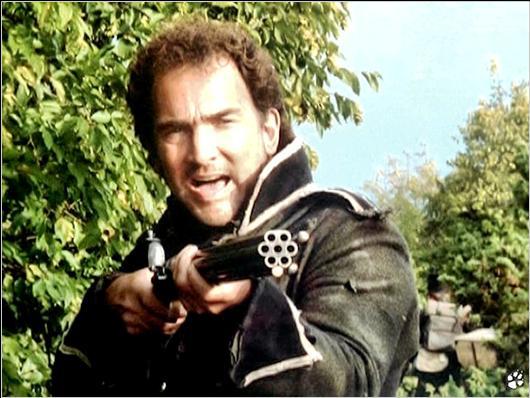 We often hear how Harper evokes the memories of his ancestors, wild-eyed and swinging weapons like a warrior of old, screaming murder in his native Gaelic tongue, as he charges into the depth of the fighting alongside his friend, Richard Sharpe.If anything, growing up in Northern Ireland with a dad from Donegal, to me it was Harper who was the real hero of Cornwell’s series! And like almost all authors of military-driven historical fiction, Cornwell, and the Sharpe novels in particular, led me to put pen to paper and write my own series of books. Based around the Norman invasion of Ireland (which began on 1st May 1169, exactly 850 years ago), it was during the research into this period that I came across a reference pointing to the real Harper family’s origins and which might give an idea of the fictional character’s background.Family myth says that the founder of the Harper family came to Ireland in the retinue of the famous invader, Richard de Clare (better remembered as Strongbow). However, unlike Patrick, the first Harper was no warrior. Instead he is believed to have been a Welsh minstrel who was rewarded by his lord for his musical skills with a small estate at Aghdare in County Wexford. It also led to his descendants adopting a new surname, remembering, perhaps, their appointment to a hereditary position at Strongbow’s noble court: le Harper.By the thirteenth century, the Harpers had a stone castle and Aghdare had become known by the new name of Harperstown. The family were no longer troubadours but had risen through patronage and political marriages to the rank of knight, giving military service to the crown in return for their lands, often alongside their Hore, Furlong and Roche neighbours. By the mid-fifteenth century the senior male line of the Harper family became extinct and their castle passed by marriage to the Hores.So, this all set me to wondering just how might our fictional hero’s family have found themselves resident at the other end of the country when Patrick Harper was born in 1785?What follows is my ‘fan-fiction’ account of the Harper family’s journey from knightly landowners in Wexford in 1450 to lowly peasant farmers in Donegal in 1800.The descendants of the Norman invaders (known as the Old English) had begun intermarrying with the native Gael within a few years of their arrival in Ireland and had adopted many of their cultural practices. This would’ve included the Irish language which Patrick Harper would use so often in the heat of battle in Cornwell’s novels.By the time of the Tudors, many of the descendants of the Old English, including the Harpers, would have become so like the Gael that they would be known as being ‘More Irish than the Irish themselves’. And in contrast to their kin in England, they retained the Catholic religion following King Henry VIII’s break with Rome. In the 1530s, it was the Old English families who launched a series of rebellions against the crown, with some taking up arms against the Protestant government in defence of the old religion. As a result, many an Irish gentleman found himself as an outlaw in his own land and might’ve joined the thousands who fled persecution to the continent, becoming mercenaries in the armies of France, Spain and Austria. Others, equally pursued by the law, took up contracts with the independent Gaelic-Irish lords such as the rebel Ulsterman, Hugh O’Neill, Earl of Tyrone.One such real-life mercenary was Richard Tyrell. Born in Spain into an ancient Old English and Catholic family from Westmeath, Tyrell became a military adviser to O’Neill during the Nine Years’ War and scored a notable victory over the government army at the Battle of Tyrellspass in 1597.Might Harper’s ancestor have performed a similar role to Tyrell on behalf of Red Hugh O’Donnell, the penultimate King of Tyrconnell, during the same period?O’Donnell’s realm roughly equated to those of modern County Donegal. In 1592, the 20-year-old king had joined forces with his neighbour O’Neill to oppose government incursions into their territories. Both declared that it was in defence of their traditional rights and religion that they rose in rebellion and many flocked to their cause. O’Donnell was certainly the sort of young lord who would’ve required the advice of a veteran soldier as he gathered and trained his forces to take on the English war machine. Could we also imagine O’Donnell granting Harper’s ancestor a small mountain estate in return for this work?
We often hear how Harper evokes the memories of his ancestors, wild-eyed and swinging weapons like a warrior of old, screaming murder in his native Gaelic tongue, as he charges into the depth of the fighting alongside his friend, Richard Sharpe.If anything, growing up in Northern Ireland with a dad from Donegal, to me it was Harper who was the real hero of Cornwell’s series! And like almost all authors of military-driven historical fiction, Cornwell, and the Sharpe novels in particular, led me to put pen to paper and write my own series of books. Based around the Norman invasion of Ireland (which began on 1st May 1169, exactly 850 years ago), it was during the research into this period that I came across a reference pointing to the real Harper family’s origins and which might give an idea of the fictional character’s background.Family myth says that the founder of the Harper family came to Ireland in the retinue of the famous invader, Richard de Clare (better remembered as Strongbow). However, unlike Patrick, the first Harper was no warrior. Instead he is believed to have been a Welsh minstrel who was rewarded by his lord for his musical skills with a small estate at Aghdare in County Wexford. It also led to his descendants adopting a new surname, remembering, perhaps, their appointment to a hereditary position at Strongbow’s noble court: le Harper.By the thirteenth century, the Harpers had a stone castle and Aghdare had become known by the new name of Harperstown. The family were no longer troubadours but had risen through patronage and political marriages to the rank of knight, giving military service to the crown in return for their lands, often alongside their Hore, Furlong and Roche neighbours. By the mid-fifteenth century the senior male line of the Harper family became extinct and their castle passed by marriage to the Hores.So, this all set me to wondering just how might our fictional hero’s family have found themselves resident at the other end of the country when Patrick Harper was born in 1785?What follows is my ‘fan-fiction’ account of the Harper family’s journey from knightly landowners in Wexford in 1450 to lowly peasant farmers in Donegal in 1800.The descendants of the Norman invaders (known as the Old English) had begun intermarrying with the native Gael within a few years of their arrival in Ireland and had adopted many of their cultural practices. This would’ve included the Irish language which Patrick Harper would use so often in the heat of battle in Cornwell’s novels.By the time of the Tudors, many of the descendants of the Old English, including the Harpers, would have become so like the Gael that they would be known as being ‘More Irish than the Irish themselves’. And in contrast to their kin in England, they retained the Catholic religion following King Henry VIII’s break with Rome. In the 1530s, it was the Old English families who launched a series of rebellions against the crown, with some taking up arms against the Protestant government in defence of the old religion. As a result, many an Irish gentleman found himself as an outlaw in his own land and might’ve joined the thousands who fled persecution to the continent, becoming mercenaries in the armies of France, Spain and Austria. Others, equally pursued by the law, took up contracts with the independent Gaelic-Irish lords such as the rebel Ulsterman, Hugh O’Neill, Earl of Tyrone.One such real-life mercenary was Richard Tyrell. Born in Spain into an ancient Old English and Catholic family from Westmeath, Tyrell became a military adviser to O’Neill during the Nine Years’ War and scored a notable victory over the government army at the Battle of Tyrellspass in 1597.Might Harper’s ancestor have performed a similar role to Tyrell on behalf of Red Hugh O’Donnell, the penultimate King of Tyrconnell, during the same period?O’Donnell’s realm roughly equated to those of modern County Donegal. In 1592, the 20-year-old king had joined forces with his neighbour O’Neill to oppose government incursions into their territories. Both declared that it was in defence of their traditional rights and religion that they rose in rebellion and many flocked to their cause. O’Donnell was certainly the sort of young lord who would’ve required the advice of a veteran soldier as he gathered and trained his forces to take on the English war machine. Could we also imagine O’Donnell granting Harper’s ancestor a small mountain estate in return for this work?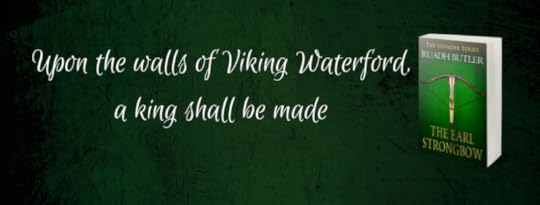 Patrick Harper was born in the townland of Tangaveane in 1785. It’s not hard to imagine his family’s fall from landowners to the peasant farmers we hear about when we first meet Harper (1807 in Sharpe’s Prey and then more fully in Sharpe’s Rifles in 1809).In 1607, Red Hugh O’Donnell and O’Neill fled Ireland never to return. Three years later King James I began the Plantation of Ulster, replacing many native landowners with Protestant colonists from Scotland and England. Without their leader, most were swept aside by the newcomers. The plantation of Donegal was principally carried out in the north and east of the county and so the Harpers of Tangaveane, a valley locked on all sides by unproductive mountain land (a few miles east of the town of Glenties), would not have been high on the planters’ agenda. As such Harper’s family might well have hung onto their hard-won property despite the cruel anti-Catholic laws of the day, living quietly as subsistence farmers in the high hills, without the notice of the big landlords in the lowlands. They would’ve married local women and had big families making it ever more difficult to make ends meet.And in 1801, when one of their number, Patrick, ‘the big wee one’, left Tangaveane to join the British Army, he might well have forgotten that his family had ever lived anywhere other than the Blue Stack Mountains, or that his paternal ancestor had come to Ireland from Britain centuries before with little more than Patrick had as he left it. Perhaps only a harp and a head full of songs from which to make his fortune.CHECK OUT MY BOOKS:SwordlandLord of the Sea CastleThe Earl Strongbow
Patrick Harper was born in the townland of Tangaveane in 1785. It’s not hard to imagine his family’s fall from landowners to the peasant farmers we hear about when we first meet Harper (1807 in Sharpe’s Prey and then more fully in Sharpe’s Rifles in 1809).In 1607, Red Hugh O’Donnell and O’Neill fled Ireland never to return. Three years later King James I began the Plantation of Ulster, replacing many native landowners with Protestant colonists from Scotland and England. Without their leader, most were swept aside by the newcomers. The plantation of Donegal was principally carried out in the north and east of the county and so the Harpers of Tangaveane, a valley locked on all sides by unproductive mountain land (a few miles east of the town of Glenties), would not have been high on the planters’ agenda. As such Harper’s family might well have hung onto their hard-won property despite the cruel anti-Catholic laws of the day, living quietly as subsistence farmers in the high hills, without the notice of the big landlords in the lowlands. They would’ve married local women and had big families making it ever more difficult to make ends meet.And in 1801, when one of their number, Patrick, ‘the big wee one’, left Tangaveane to join the British Army, he might well have forgotten that his family had ever lived anywhere other than the Blue Stack Mountains, or that his paternal ancestor had come to Ireland from Britain centuries before with little more than Patrick had as he left it. Perhaps only a harp and a head full of songs from which to make his fortune.CHECK OUT MY BOOKS:SwordlandLord of the Sea CastleThe Earl Strongbow
 We often hear how Harper evokes the memories of his ancestors, wild-eyed and swinging weapons like a warrior of old, screaming murder in his native Gaelic tongue, as he charges into the depth of the fighting alongside his friend, Richard Sharpe.If anything, growing up in Northern Ireland with a dad from Donegal, to me it was Harper who was the real hero of Cornwell’s series! And like almost all authors of military-driven historical fiction, Cornwell, and the Sharpe novels in particular, led me to put pen to paper and write my own series of books. Based around the Norman invasion of Ireland (which began on 1st May 1169, exactly 850 years ago), it was during the research into this period that I came across a reference pointing to the real Harper family’s origins and which might give an idea of the fictional character’s background.Family myth says that the founder of the Harper family came to Ireland in the retinue of the famous invader, Richard de Clare (better remembered as Strongbow). However, unlike Patrick, the first Harper was no warrior. Instead he is believed to have been a Welsh minstrel who was rewarded by his lord for his musical skills with a small estate at Aghdare in County Wexford. It also led to his descendants adopting a new surname, remembering, perhaps, their appointment to a hereditary position at Strongbow’s noble court: le Harper.By the thirteenth century, the Harpers had a stone castle and Aghdare had become known by the new name of Harperstown. The family were no longer troubadours but had risen through patronage and political marriages to the rank of knight, giving military service to the crown in return for their lands, often alongside their Hore, Furlong and Roche neighbours. By the mid-fifteenth century the senior male line of the Harper family became extinct and their castle passed by marriage to the Hores.So, this all set me to wondering just how might our fictional hero’s family have found themselves resident at the other end of the country when Patrick Harper was born in 1785?What follows is my ‘fan-fiction’ account of the Harper family’s journey from knightly landowners in Wexford in 1450 to lowly peasant farmers in Donegal in 1800.The descendants of the Norman invaders (known as the Old English) had begun intermarrying with the native Gael within a few years of their arrival in Ireland and had adopted many of their cultural practices. This would’ve included the Irish language which Patrick Harper would use so often in the heat of battle in Cornwell’s novels.By the time of the Tudors, many of the descendants of the Old English, including the Harpers, would have become so like the Gael that they would be known as being ‘More Irish than the Irish themselves’. And in contrast to their kin in England, they retained the Catholic religion following King Henry VIII’s break with Rome. In the 1530s, it was the Old English families who launched a series of rebellions against the crown, with some taking up arms against the Protestant government in defence of the old religion. As a result, many an Irish gentleman found himself as an outlaw in his own land and might’ve joined the thousands who fled persecution to the continent, becoming mercenaries in the armies of France, Spain and Austria. Others, equally pursued by the law, took up contracts with the independent Gaelic-Irish lords such as the rebel Ulsterman, Hugh O’Neill, Earl of Tyrone.One such real-life mercenary was Richard Tyrell. Born in Spain into an ancient Old English and Catholic family from Westmeath, Tyrell became a military adviser to O’Neill during the Nine Years’ War and scored a notable victory over the government army at the Battle of Tyrellspass in 1597.Might Harper’s ancestor have performed a similar role to Tyrell on behalf of Red Hugh O’Donnell, the penultimate King of Tyrconnell, during the same period?O’Donnell’s realm roughly equated to those of modern County Donegal. In 1592, the 20-year-old king had joined forces with his neighbour O’Neill to oppose government incursions into their territories. Both declared that it was in defence of their traditional rights and religion that they rose in rebellion and many flocked to their cause. O’Donnell was certainly the sort of young lord who would’ve required the advice of a veteran soldier as he gathered and trained his forces to take on the English war machine. Could we also imagine O’Donnell granting Harper’s ancestor a small mountain estate in return for this work?
We often hear how Harper evokes the memories of his ancestors, wild-eyed and swinging weapons like a warrior of old, screaming murder in his native Gaelic tongue, as he charges into the depth of the fighting alongside his friend, Richard Sharpe.If anything, growing up in Northern Ireland with a dad from Donegal, to me it was Harper who was the real hero of Cornwell’s series! And like almost all authors of military-driven historical fiction, Cornwell, and the Sharpe novels in particular, led me to put pen to paper and write my own series of books. Based around the Norman invasion of Ireland (which began on 1st May 1169, exactly 850 years ago), it was during the research into this period that I came across a reference pointing to the real Harper family’s origins and which might give an idea of the fictional character’s background.Family myth says that the founder of the Harper family came to Ireland in the retinue of the famous invader, Richard de Clare (better remembered as Strongbow). However, unlike Patrick, the first Harper was no warrior. Instead he is believed to have been a Welsh minstrel who was rewarded by his lord for his musical skills with a small estate at Aghdare in County Wexford. It also led to his descendants adopting a new surname, remembering, perhaps, their appointment to a hereditary position at Strongbow’s noble court: le Harper.By the thirteenth century, the Harpers had a stone castle and Aghdare had become known by the new name of Harperstown. The family were no longer troubadours but had risen through patronage and political marriages to the rank of knight, giving military service to the crown in return for their lands, often alongside their Hore, Furlong and Roche neighbours. By the mid-fifteenth century the senior male line of the Harper family became extinct and their castle passed by marriage to the Hores.So, this all set me to wondering just how might our fictional hero’s family have found themselves resident at the other end of the country when Patrick Harper was born in 1785?What follows is my ‘fan-fiction’ account of the Harper family’s journey from knightly landowners in Wexford in 1450 to lowly peasant farmers in Donegal in 1800.The descendants of the Norman invaders (known as the Old English) had begun intermarrying with the native Gael within a few years of their arrival in Ireland and had adopted many of their cultural practices. This would’ve included the Irish language which Patrick Harper would use so often in the heat of battle in Cornwell’s novels.By the time of the Tudors, many of the descendants of the Old English, including the Harpers, would have become so like the Gael that they would be known as being ‘More Irish than the Irish themselves’. And in contrast to their kin in England, they retained the Catholic religion following King Henry VIII’s break with Rome. In the 1530s, it was the Old English families who launched a series of rebellions against the crown, with some taking up arms against the Protestant government in defence of the old religion. As a result, many an Irish gentleman found himself as an outlaw in his own land and might’ve joined the thousands who fled persecution to the continent, becoming mercenaries in the armies of France, Spain and Austria. Others, equally pursued by the law, took up contracts with the independent Gaelic-Irish lords such as the rebel Ulsterman, Hugh O’Neill, Earl of Tyrone.One such real-life mercenary was Richard Tyrell. Born in Spain into an ancient Old English and Catholic family from Westmeath, Tyrell became a military adviser to O’Neill during the Nine Years’ War and scored a notable victory over the government army at the Battle of Tyrellspass in 1597.Might Harper’s ancestor have performed a similar role to Tyrell on behalf of Red Hugh O’Donnell, the penultimate King of Tyrconnell, during the same period?O’Donnell’s realm roughly equated to those of modern County Donegal. In 1592, the 20-year-old king had joined forces with his neighbour O’Neill to oppose government incursions into their territories. Both declared that it was in defence of their traditional rights and religion that they rose in rebellion and many flocked to their cause. O’Donnell was certainly the sort of young lord who would’ve required the advice of a veteran soldier as he gathered and trained his forces to take on the English war machine. Could we also imagine O’Donnell granting Harper’s ancestor a small mountain estate in return for this work? Patrick Harper was born in the townland of Tangaveane in 1785. It’s not hard to imagine his family’s fall from landowners to the peasant farmers we hear about when we first meet Harper (1807 in Sharpe’s Prey and then more fully in Sharpe’s Rifles in 1809).In 1607, Red Hugh O’Donnell and O’Neill fled Ireland never to return. Three years later King James I began the Plantation of Ulster, replacing many native landowners with Protestant colonists from Scotland and England. Without their leader, most were swept aside by the newcomers. The plantation of Donegal was principally carried out in the north and east of the county and so the Harpers of Tangaveane, a valley locked on all sides by unproductive mountain land (a few miles east of the town of Glenties), would not have been high on the planters’ agenda. As such Harper’s family might well have hung onto their hard-won property despite the cruel anti-Catholic laws of the day, living quietly as subsistence farmers in the high hills, without the notice of the big landlords in the lowlands. They would’ve married local women and had big families making it ever more difficult to make ends meet.And in 1801, when one of their number, Patrick, ‘the big wee one’, left Tangaveane to join the British Army, he might well have forgotten that his family had ever lived anywhere other than the Blue Stack Mountains, or that his paternal ancestor had come to Ireland from Britain centuries before with little more than Patrick had as he left it. Perhaps only a harp and a head full of songs from which to make his fortune.CHECK OUT MY BOOKS:SwordlandLord of the Sea CastleThe Earl Strongbow
Patrick Harper was born in the townland of Tangaveane in 1785. It’s not hard to imagine his family’s fall from landowners to the peasant farmers we hear about when we first meet Harper (1807 in Sharpe’s Prey and then more fully in Sharpe’s Rifles in 1809).In 1607, Red Hugh O’Donnell and O’Neill fled Ireland never to return. Three years later King James I began the Plantation of Ulster, replacing many native landowners with Protestant colonists from Scotland and England. Without their leader, most were swept aside by the newcomers. The plantation of Donegal was principally carried out in the north and east of the county and so the Harpers of Tangaveane, a valley locked on all sides by unproductive mountain land (a few miles east of the town of Glenties), would not have been high on the planters’ agenda. As such Harper’s family might well have hung onto their hard-won property despite the cruel anti-Catholic laws of the day, living quietly as subsistence farmers in the high hills, without the notice of the big landlords in the lowlands. They would’ve married local women and had big families making it ever more difficult to make ends meet.And in 1801, when one of their number, Patrick, ‘the big wee one’, left Tangaveane to join the British Army, he might well have forgotten that his family had ever lived anywhere other than the Blue Stack Mountains, or that his paternal ancestor had come to Ireland from Britain centuries before with little more than Patrick had as he left it. Perhaps only a harp and a head full of songs from which to make his fortune.CHECK OUT MY BOOKS:SwordlandLord of the Sea CastleThe Earl Strongbow
Published on April 30, 2019 06:44
March 18, 2019
St Paddy's Day giveaway winners
Firstly, welcome to all the new members of the conrois!Hundreds of people have signed up, liked, followed, enlisted, and friended across my social media channels since I announced the St Patrick's Day giveaway of copies of The Earl Strongbow a few days ago. Hopefully you'll all hang around to hear me talk about the Normans in Ireland even if you haven't won a book on this occasion. Be assured, there will be more opportunities to get books over the next few months!Secondly, thank you to everyone who took the time to share and spread the news about the giveaway - it really helps!But there can be only ... four.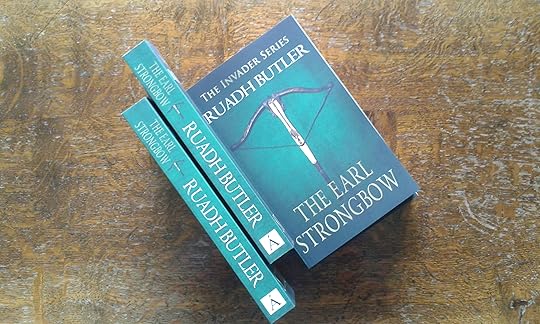 Three signed copies of my most recent work will go to new followers of my social media (YouTube, Facebook, Twitter and Instagram) while another was set aside for one of those who had been a follower beforehand.The 'new' winners are: Claire Fraser, David Douglas and Karen Anderson with Martin Doheny winning the 'originals' competition.Congratulations to all the winners. I'll send out your signed copies during the week.2019 is a very special year. It is 850 years since Robert FitzStephen landed his army of 400 Normans, Welsh, Flemings, Bretons and Englishmen at Bannow Bay in County Wexford on Ireland's south coast. Those men could not have known how loud their actions would echo or for how long. So keep your ear to the ground for more news!
Three signed copies of my most recent work will go to new followers of my social media (YouTube, Facebook, Twitter and Instagram) while another was set aside for one of those who had been a follower beforehand.The 'new' winners are: Claire Fraser, David Douglas and Karen Anderson with Martin Doheny winning the 'originals' competition.Congratulations to all the winners. I'll send out your signed copies during the week.2019 is a very special year. It is 850 years since Robert FitzStephen landed his army of 400 Normans, Welsh, Flemings, Bretons and Englishmen at Bannow Bay in County Wexford on Ireland's south coast. Those men could not have known how loud their actions would echo or for how long. So keep your ear to the ground for more news!
 Three signed copies of my most recent work will go to new followers of my social media (YouTube, Facebook, Twitter and Instagram) while another was set aside for one of those who had been a follower beforehand.The 'new' winners are: Claire Fraser, David Douglas and Karen Anderson with Martin Doheny winning the 'originals' competition.Congratulations to all the winners. I'll send out your signed copies during the week.2019 is a very special year. It is 850 years since Robert FitzStephen landed his army of 400 Normans, Welsh, Flemings, Bretons and Englishmen at Bannow Bay in County Wexford on Ireland's south coast. Those men could not have known how loud their actions would echo or for how long. So keep your ear to the ground for more news!
Three signed copies of my most recent work will go to new followers of my social media (YouTube, Facebook, Twitter and Instagram) while another was set aside for one of those who had been a follower beforehand.The 'new' winners are: Claire Fraser, David Douglas and Karen Anderson with Martin Doheny winning the 'originals' competition.Congratulations to all the winners. I'll send out your signed copies during the week.2019 is a very special year. It is 850 years since Robert FitzStephen landed his army of 400 Normans, Welsh, Flemings, Bretons and Englishmen at Bannow Bay in County Wexford on Ireland's south coast. Those men could not have known how loud their actions would echo or for how long. So keep your ear to the ground for more news!
Published on March 18, 2019 15:53
March 14, 2019
St Patrick's Day book giveaway!
In celebration of that most holy of holy days I have decided to do a St Patrick's Day giveaway!What’s on offer? Three signed paperback copies of my greenest book, The Earl Strongbow, on this most emerald of weekends. To enter, simply give me a follow and a retweet on Twitter, or head over to my author page on Facebook and give it a like, subscribe to my YouTube channel, or search me out on Instagram. The cut off is at 12 noon GMT on Monday, March 18th.And fear not those already signed up to those social media – I’m going to choose one of you lovely folks for a signed free copy of The Earl Strongbow too! I’ll make the draws on Monday night (sufficient recovery time required!) and get in touch with the winners soon thereafter. Good luck and drink up!
To enter, simply give me a follow and a retweet on Twitter, or head over to my author page on Facebook and give it a like, subscribe to my YouTube channel, or search me out on Instagram. The cut off is at 12 noon GMT on Monday, March 18th.And fear not those already signed up to those social media – I’m going to choose one of you lovely folks for a signed free copy of The Earl Strongbow too! I’ll make the draws on Monday night (sufficient recovery time required!) and get in touch with the winners soon thereafter. Good luck and drink up!
 To enter, simply give me a follow and a retweet on Twitter, or head over to my author page on Facebook and give it a like, subscribe to my YouTube channel, or search me out on Instagram. The cut off is at 12 noon GMT on Monday, March 18th.And fear not those already signed up to those social media – I’m going to choose one of you lovely folks for a signed free copy of The Earl Strongbow too! I’ll make the draws on Monday night (sufficient recovery time required!) and get in touch with the winners soon thereafter. Good luck and drink up!
To enter, simply give me a follow and a retweet on Twitter, or head over to my author page on Facebook and give it a like, subscribe to my YouTube channel, or search me out on Instagram. The cut off is at 12 noon GMT on Monday, March 18th.And fear not those already signed up to those social media – I’m going to choose one of you lovely folks for a signed free copy of The Earl Strongbow too! I’ll make the draws on Monday night (sufficient recovery time required!) and get in touch with the winners soon thereafter. Good luck and drink up!
Published on March 14, 2019 09:22
March 4, 2019
Video: Beaghmore Stone Circles
Some of Ireland's most ancient wonders happen to be sited just on my doorstep in Tyrone. A few months ago I went up into the foothills of the Sperrin Mountains with my phone and took a walk around the amazing stone circles at Beaghmore.Check out the wondrous Neolithic site here:
Published on March 04, 2019 03:39
June 29, 2018
Inspirational Quotes IX: EM Powell
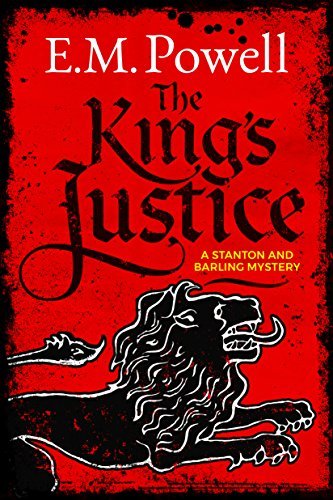 Scheming? Murder? 12th century England? Set with the backdrop of one of the most important creations in history?EM Powell’s new novel, The King’s Justice, ticks all the boxes.It is 1176 – the height of King Henry II’s reign - and Aelred Barling and his assistant, Hugo Stanton, journey to Yorkshire to investigate what seems, on the surface, to be the straightforward death of a villager. However, the story develops into a veritable whodunit with many twists and turns as Barling and Stanton not only attempt to get to grips with the murderer but with each other.And while the novel doesn’t deal with as a famous an event as the murder of Thomas Becket (as Powell did to kick off her The Fifth Knight series) if anything, The King’s Justice is based around and even more important occurrence – King Henry’s reform of the justice system. This was the era when Henry established laws and regulations which inform and influence our own modern law system and most of those in the western world.Heady stuff indeed – but set amidst a high-paced investigation, murder, mayhem and maybe even a larger conspiracy? We shall have to wait and see as this fantastic new series continues next year!The author was kind enough to take on a few questions posed by some of the world’s most inspirational lines of literature to give us a little bit more insight into her writing life, her new story, and the world at large.‘No need to hurry. No need to sparkle. No need to be anybody but oneself.’ Virginia Woolf
Scheming? Murder? 12th century England? Set with the backdrop of one of the most important creations in history?EM Powell’s new novel, The King’s Justice, ticks all the boxes.It is 1176 – the height of King Henry II’s reign - and Aelred Barling and his assistant, Hugo Stanton, journey to Yorkshire to investigate what seems, on the surface, to be the straightforward death of a villager. However, the story develops into a veritable whodunit with many twists and turns as Barling and Stanton not only attempt to get to grips with the murderer but with each other.And while the novel doesn’t deal with as a famous an event as the murder of Thomas Becket (as Powell did to kick off her The Fifth Knight series) if anything, The King’s Justice is based around and even more important occurrence – King Henry’s reform of the justice system. This was the era when Henry established laws and regulations which inform and influence our own modern law system and most of those in the western world.Heady stuff indeed – but set amidst a high-paced investigation, murder, mayhem and maybe even a larger conspiracy? We shall have to wait and see as this fantastic new series continues next year!The author was kind enough to take on a few questions posed by some of the world’s most inspirational lines of literature to give us a little bit more insight into her writing life, her new story, and the world at large.‘No need to hurry. No need to sparkle. No need to be anybody but oneself.’ Virginia Woolf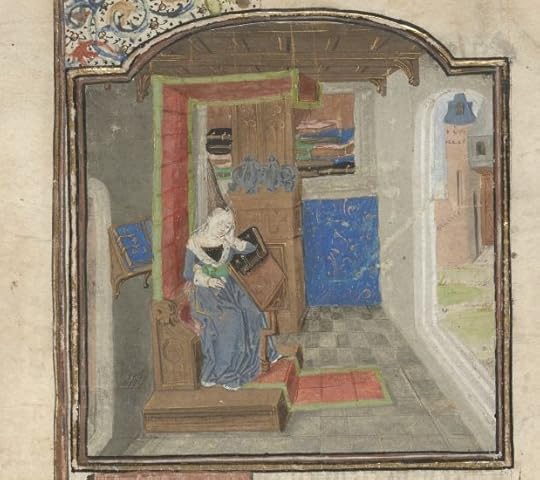 I love this quote from Virginia Woolf as I think it’s a salutary reminder about what’s important in life. There’s a huge pressure to be the sparkly version of oneself, particularly on social media. One could of course avoid social media but the expectation is that writers should have an active presence on there. Some of it’s great (like Ruadh’s historical/dog photos!) but it’s not something that lends itself to a writer’s brain - at least not this writer anyway. When I’m writing, I go into a very different mindset, one that’s almost dreamlike. I’ve gone into my fictional world and a post on the screen blaring ‘YOU WON’T BELIEVE WHAT MEGHAN MARKLE SAID TO HARRY!’ has the effect of a) throwing me right out of that world and b) irritating me beyond belief. I much prefer to be like 14th Century Christine de Pizan, chin in hand, staring into space/out the window while I solve a knotty plot point. As for hurrying, I’m Irish. Hurrying gives me hives.‘We were the people who were not in the papers. We lived in the blank white spaces at the edges of print. It gave us more freedom. We lived in the gaps between the stories.’ Margaret Atwood
I love this quote from Virginia Woolf as I think it’s a salutary reminder about what’s important in life. There’s a huge pressure to be the sparkly version of oneself, particularly on social media. One could of course avoid social media but the expectation is that writers should have an active presence on there. Some of it’s great (like Ruadh’s historical/dog photos!) but it’s not something that lends itself to a writer’s brain - at least not this writer anyway. When I’m writing, I go into a very different mindset, one that’s almost dreamlike. I’ve gone into my fictional world and a post on the screen blaring ‘YOU WON’T BELIEVE WHAT MEGHAN MARKLE SAID TO HARRY!’ has the effect of a) throwing me right out of that world and b) irritating me beyond belief. I much prefer to be like 14th Century Christine de Pizan, chin in hand, staring into space/out the window while I solve a knotty plot point. As for hurrying, I’m Irish. Hurrying gives me hives.‘We were the people who were not in the papers. We lived in the blank white spaces at the edges of print. It gave us more freedom. We lived in the gaps between the stories.’ Margaret Atwood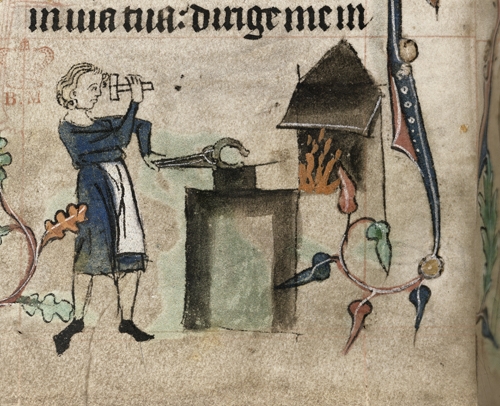 This quote reminds me of the type of characters that I most like to write about in historical fiction: ordinary people, those who don’t necessarily make it into the history books. When one visits a medieval castle or a stately home, it’s always tempting to imagine oneself as living there in the past. But for most people reading this blog, our ancestors would be nowhere near the solars or the upper floors of the Big House. We’d have been growing crops, hauling hay, doing laundry, baking bread. If any of us were part of a fighting force, we wouldn’t have been on the back of a horse. We’d have been a front row expendable. That’s why I’ve had such fun writing my new Stanton & Barling medieval crime series, starting with THE KING’S JUSTICE. Yes, Aelred Barling is a royal law clerk and Hugo Stanton is a messenger, but the brutal murder they’ve been sent to investigate is that of a village smith. No kings or queens, just ordinary murdering folk. Like I say - great fun!‘Finally, from so little sleeping and so much reading, his brain dried up and he went completely out of his mind.’ Miguel de Cervantes
This quote reminds me of the type of characters that I most like to write about in historical fiction: ordinary people, those who don’t necessarily make it into the history books. When one visits a medieval castle or a stately home, it’s always tempting to imagine oneself as living there in the past. But for most people reading this blog, our ancestors would be nowhere near the solars or the upper floors of the Big House. We’d have been growing crops, hauling hay, doing laundry, baking bread. If any of us were part of a fighting force, we wouldn’t have been on the back of a horse. We’d have been a front row expendable. That’s why I’ve had such fun writing my new Stanton & Barling medieval crime series, starting with THE KING’S JUSTICE. Yes, Aelred Barling is a royal law clerk and Hugo Stanton is a messenger, but the brutal murder they’ve been sent to investigate is that of a village smith. No kings or queens, just ordinary murdering folk. Like I say - great fun!‘Finally, from so little sleeping and so much reading, his brain dried up and he went completely out of his mind.’ Miguel de Cervantes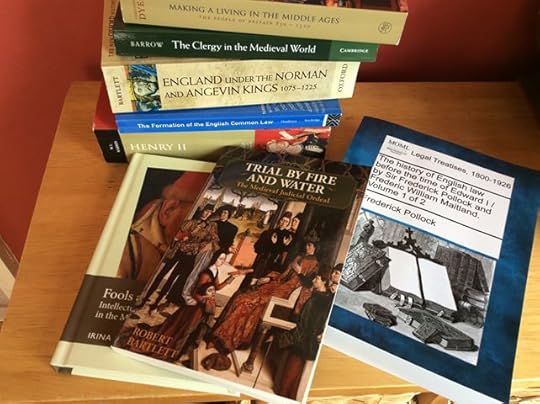 Yes, that’s a fair summation of what it’s like to be a historical fiction writer. The research side is of course fascinating but takes a huge amount of time and effort. It also doesn’t lend itself to perfectionists. The temptation to find just one more source, or ‘Oh, look! Another book* on Amazon that’s about left-handed medieval scythes in Yorkshire!’ is often too great. Yes, one has to do one’s homework. But one also has to stop. Otherwise one is in full Cervantes mode.*For people who are now eagerly searching, I made this up. I’m so sorry to disappoint.‘It did what all ads are supposed to do: create an anxiety relievable by purchase.’ David Foster Wallace
Yes, that’s a fair summation of what it’s like to be a historical fiction writer. The research side is of course fascinating but takes a huge amount of time and effort. It also doesn’t lend itself to perfectionists. The temptation to find just one more source, or ‘Oh, look! Another book* on Amazon that’s about left-handed medieval scythes in Yorkshire!’ is often too great. Yes, one has to do one’s homework. But one also has to stop. Otherwise one is in full Cervantes mode.*For people who are now eagerly searching, I made this up. I’m so sorry to disappoint.‘It did what all ads are supposed to do: create an anxiety relievable by purchase.’ David Foster Wallace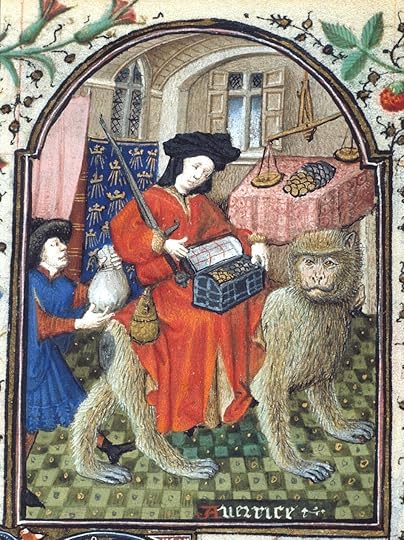 I seized upon this one because it sums up so well an issue dear to my heart: rampant consumerism and the effect that it’s having on our beautiful planet. In short, we don’t need so much stuff. We definitely don’t need the ‘gifts’ that are advertised for supposedly unmissable events on the calendar. Valentine’s Day (red rubbish), St Patrick’s Day (green rubbish), Mother’s Day (pink rubbish), Father’s Day (blue rubbish), Thank You Teacher (teddy bears with said message on its stomach/rubbish), Halloween (orange rubbish)- these are just a few. So much tat changing hands, and a huge amount of it made of plastic and almost all of it ending up in landfill/the ocean for the next millennium. And all of it bought by people who felt they ought to, because the makers of said rubbish push it relentlessly via advertising. Lest anybody think I’m just being grumpy, Advent is now a season. For shopping. Apparently, you don’t love your female significant other if you don’t buy her an Advent Calendar that has a different item of make up behind each window. Can anybody else hear the hoofbeats of the Apocalypse, or is it just me?
I seized upon this one because it sums up so well an issue dear to my heart: rampant consumerism and the effect that it’s having on our beautiful planet. In short, we don’t need so much stuff. We definitely don’t need the ‘gifts’ that are advertised for supposedly unmissable events on the calendar. Valentine’s Day (red rubbish), St Patrick’s Day (green rubbish), Mother’s Day (pink rubbish), Father’s Day (blue rubbish), Thank You Teacher (teddy bears with said message on its stomach/rubbish), Halloween (orange rubbish)- these are just a few. So much tat changing hands, and a huge amount of it made of plastic and almost all of it ending up in landfill/the ocean for the next millennium. And all of it bought by people who felt they ought to, because the makers of said rubbish push it relentlessly via advertising. Lest anybody think I’m just being grumpy, Advent is now a season. For shopping. Apparently, you don’t love your female significant other if you don’t buy her an Advent Calendar that has a different item of make up behind each window. Can anybody else hear the hoofbeats of the Apocalypse, or is it just me?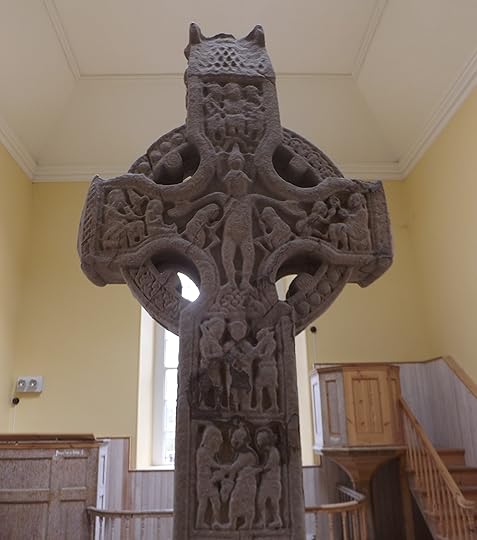 ‘Three ruins of a tribe: a lying chief, a false judge, a lustful priest.’ 9th century Irish Triad.This last quote isn’t one of Ruadh’s but one of which I am particularly fond. Triads, the arrangement of ideas or sayings in groups of three, are common in ancient Irish and Welsh writing. They are a type of wisdom literature, serving to instruct, enlighten and at times entertain the reader/listener with truths about life. Trecheng Breth Féne or The Triads of Ireland is a collection composed about the 9th century AD by an anonymous author who was most likely a cleric. One might think that the Irish Triad wisdom of over 1,100 years ago would be remote and/or inaccessible. But reading that quote, one has to wonder if that cleric had access to a 21st Century wormhole. And they never bother mentioning Meghan Markle.BUYThe King’s JusticeGET IN TOUCH WITH THE AUTHORWebsiteBlogFacebookTwitterGoodreads
‘Three ruins of a tribe: a lying chief, a false judge, a lustful priest.’ 9th century Irish Triad.This last quote isn’t one of Ruadh’s but one of which I am particularly fond. Triads, the arrangement of ideas or sayings in groups of three, are common in ancient Irish and Welsh writing. They are a type of wisdom literature, serving to instruct, enlighten and at times entertain the reader/listener with truths about life. Trecheng Breth Féne or The Triads of Ireland is a collection composed about the 9th century AD by an anonymous author who was most likely a cleric. One might think that the Irish Triad wisdom of over 1,100 years ago would be remote and/or inaccessible. But reading that quote, one has to wonder if that cleric had access to a 21st Century wormhole. And they never bother mentioning Meghan Markle.BUYThe King’s JusticeGET IN TOUCH WITH THE AUTHORWebsiteBlogFacebookTwitterGoodreads BIOGRAPHYE.M. Powell’s historical thriller Fifth Knight novels have been #1 Amazon and Bild bestsellers. Her new Stanton & Barling medieval murder mystery series starts with THE KING’S JUSTICE. She is a contributing editor to International Thriller Writers The Big Thrill magazine, blogs for English Historical Fiction Authors and is the social media manager for the Historical Novel Society.Born and raised in the Republic of Ireland into the family of Michael Collins (the legendary revolutionary and founder of the Irish Free State), she now lives in northwest England with her husband, daughter and a Facebook-friendly dog.
BIOGRAPHYE.M. Powell’s historical thriller Fifth Knight novels have been #1 Amazon and Bild bestsellers. Her new Stanton & Barling medieval murder mystery series starts with THE KING’S JUSTICE. She is a contributing editor to International Thriller Writers The Big Thrill magazine, blogs for English Historical Fiction Authors and is the social media manager for the Historical Novel Society.Born and raised in the Republic of Ireland into the family of Michael Collins (the legendary revolutionary and founder of the Irish Free State), she now lives in northwest England with her husband, daughter and a Facebook-friendly dog.
Published on June 29, 2018 01:55



